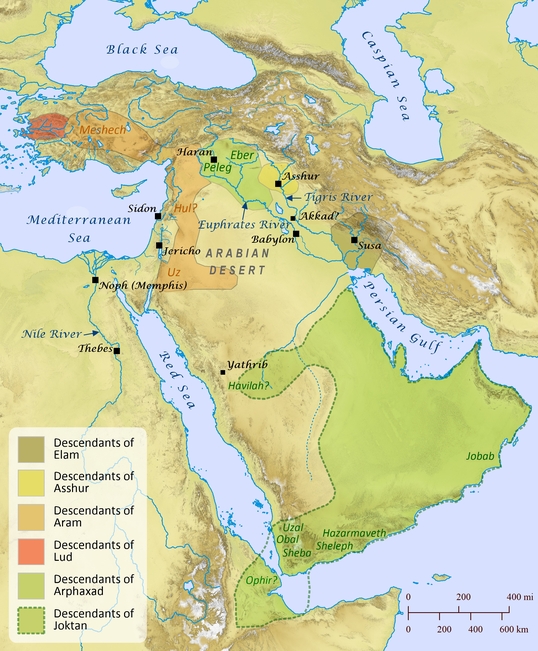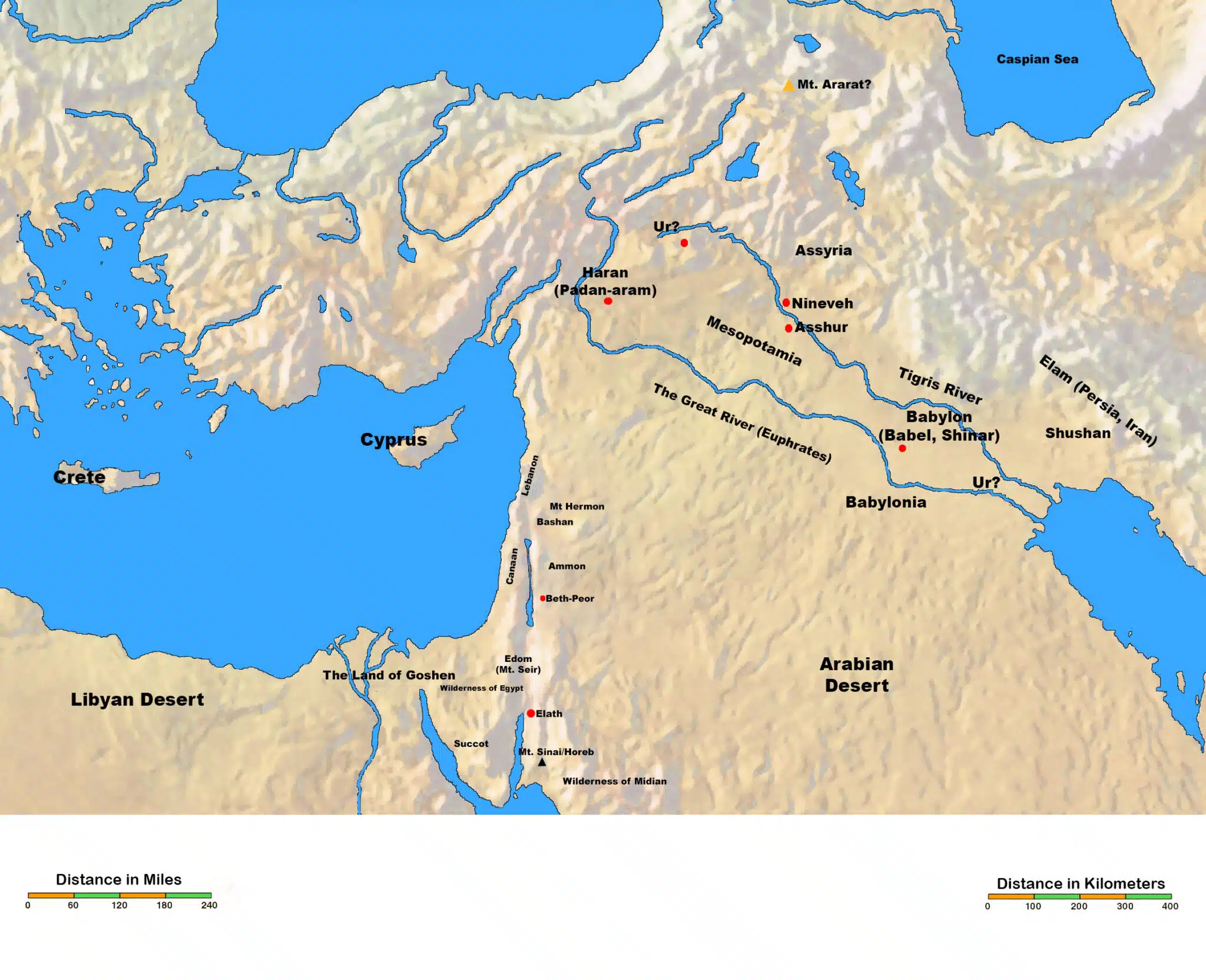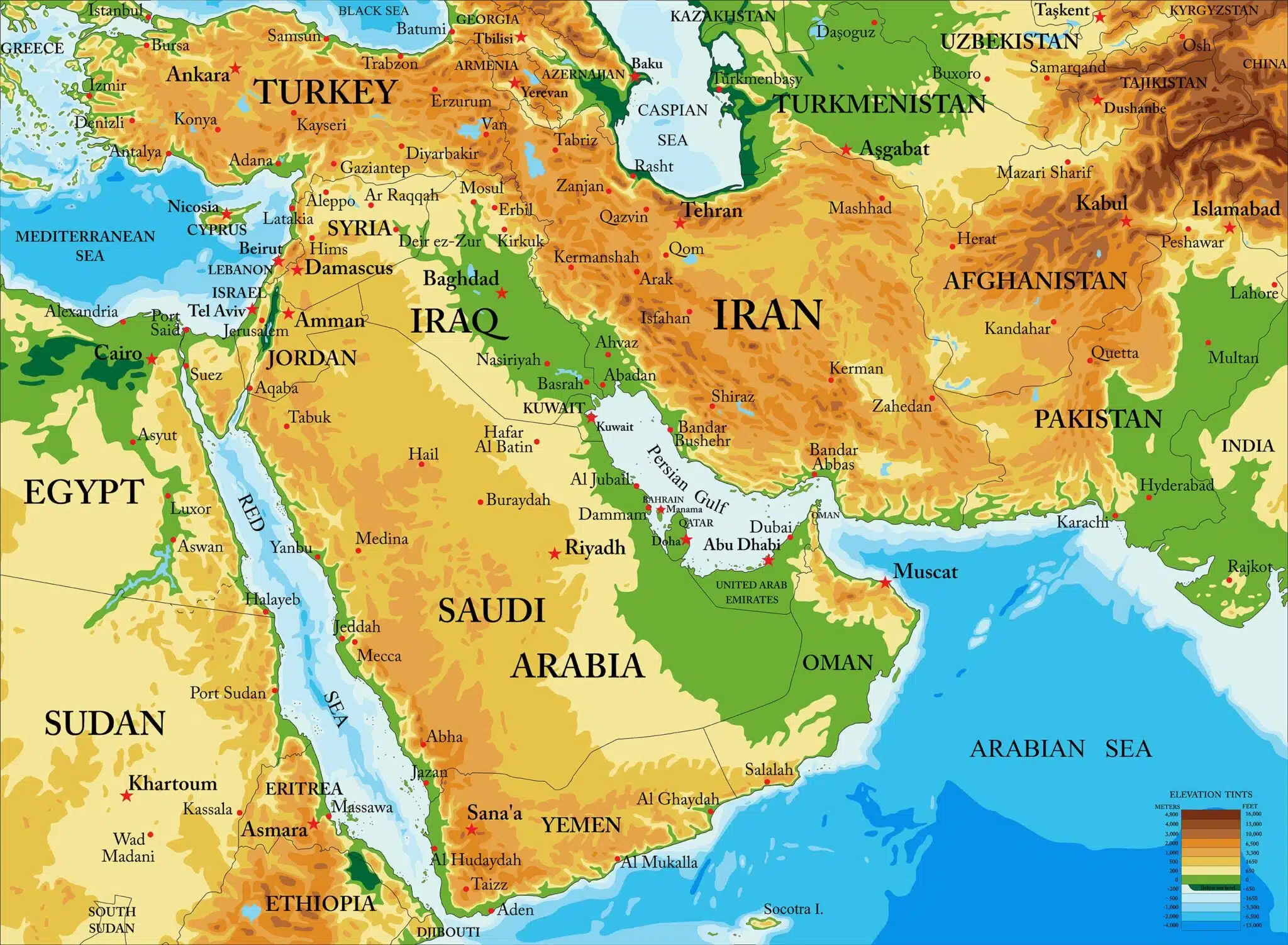Eber had two sons. Joktan had thirteen sons. Peleg fathered two sons, one of them was Abraham.
Two sons were born to Eber; the name of the one was Peleg, for in his days the earth was divided; and his brother’s name was Joktan:
Peleg was a son of Eber. His name means division or to divide. The reference that “in his days was the earth divided,” (Genesis 10:25) is likely a reference to the division of tongues that occurred at Babel prompting the term dor ha-pallagah, “the generation of the dispersal/confusion of speech” (Genesis 11:1-9; Psalm 55:9-10). He settled in the land of Ur.
Joktan was a son of Eber. Joktan became the father of Almodad and Sheleph and Hazarmaveth and Jerah and Hadoram and Uzal and Diklah and Obal and Abimael and Sheba and Ophir and Havilah and Jobab; all these were the sons of Joktan. His sons settled in southern Arabia. His descendants would become the Arabian tribes. Incidentally, the name Joktan can mean “smallness or diminution” and may have some wordplay with the name of his brother Peleg, perhaps because Joktan is the younger brother. Tribes in southern Arabia claim that pure Arabs are descended from Qahḣṫān Yoqtan.
Joktan’s sons consist of half the total names of Shem’s linage. Joktan fathered thirteen sons:
Almodad was a son of Joktan. His name in Hebrew elmōdad means “God is a friend.” He settled in modern-day southern Yemen.
Sheleph was a son of Joktan. His descendants became an Arabian tribe that settled in modern Yemen. They are identified with the district Silf, and with Yemenite tribes called Salf or Sulf, all near Aden.
Hazarmaveth was a son of Joktan. His name in Hebrew means “court of death.” He moved to southern Arabia located in present-day Hadramaut on the southern coast east of Yemen.
Jerah was a son of Joktan. His name in Hebrew means “new moon.” The moon was the leading deity in the South Arabian pantheon. He lived in the region of Yemen known as Warah.
Hadoram was a son of Joktan. His descendants became Arabian. The modern city
Dauraum near Sanʿa, capital of Yemen is associated with Hadoram.
Uzal or Azal was a son of Joktan. He became a tribal leader and founded the city Uzal, replacing the old name of Sanaa, a capital of Yemen in pre-Islamic times in northeast Syria (Ezekiel 27:19).
Diklah was a son of Joktan. He settled in a southern Arabian oasis in Mina, modern Yemen. His name in Hebrew means “Palm grove.”
Obal was a son of Joktan. He settled in southwest Arabia, present-day Yemen. ʿAbil is a common place name in Yemen.
Abimael was a son of Joktan. His name in Hebrew means “my father is El (God).” His descendants became the Sabaeans.
Sheba was a son of Joktan. Do not confuse this Sheba with the son of Ham having the same name. This Sheba settled in southern Arabia (Psalm 72:10). There was a tradition of Sabean richness and close association with Israel, especially in the days of Solomon. The queen of Sheba visited Solomon (1 Kings 10:1-13). Sheba was an exporter of gold, frankincense, and other luxuries (. Psalm 72:10,15; Isaiah 60:6). The kingdom of Sheba was established near the beginning of the first millennium B.C. Its capital was Marib, about two hundred miles north of Aden in southwest Arabia. It was also mentioned in Assyrian texts.
Ophir was the eleventh son of Joktan. He founded the city of Ophir, which was known for its fine gold. Ophir lived in southwest Arabia between Sheba and Havilah. It was most likely located somewhere on the shores of the Red Sea and reached by ships sailing from the southern port of Ezion-Geber (1 Kings 9:26-28; Psalm 45:10). A historical side note; an ostracon found at Tell Qasileh on the River Yarkon northeast of Tel Aviv reads, “Gold from Ophir for Beth Horon 30 Shekels.”
Havilah was a son of Joktan. He became a leader of clans in Arabia.
Jobab was a son of Joktan. He settled in southern Arabia. He was possibly an Edomite king (Genesis 36:33–34), also see Josh 11:1; 1 Chronicles 8:9,18. He may have connections to Arabia, such as the Sabean tribe Yuhaybab.
Biblical Text
25 Two sons were born to Eber; the name of the one was Peleg, for in his days the earth was divided; and his brother’s name was Joktan. 26 Joktan became the father of Almodad and Sheleph and Hazarmaveth and Jerah 27 and Hadoram and Uzal and Diklah 28 and Obal and Abimael and Sheba 29 and Ophir and Havilah and Jobab; all these were the sons of Joktan.
Check out our other commentaries:
-
Haggai 2:3-9 meaning
The prophet Haggai continues with the second message. He urges the returning exiles of Judah to remain strong to rebuild the temple of the LORD....... -
Matthew 23:37-39 meaning
Jesus’s final public teaching before His arrest was a lament and acknowledgment of His people’s rejection of Him as the Messiah. It was coupled with...... -
Matthew 18:6-7 meaning
Having taught about greatness in the kingdom, Jesus now teaches about failure. He teaches that becoming a stumbling block to little ones is an immediate...... -
Romans 16:9-12 meaning
Paul continues listing believers whom he wants the believers in Rome to greet....... -
Exodus 39:8-21 meaning
Along with the ephod, the high priest wore a breastpiece. It was made of the same material as the ephod and had twelve stones arranged......





